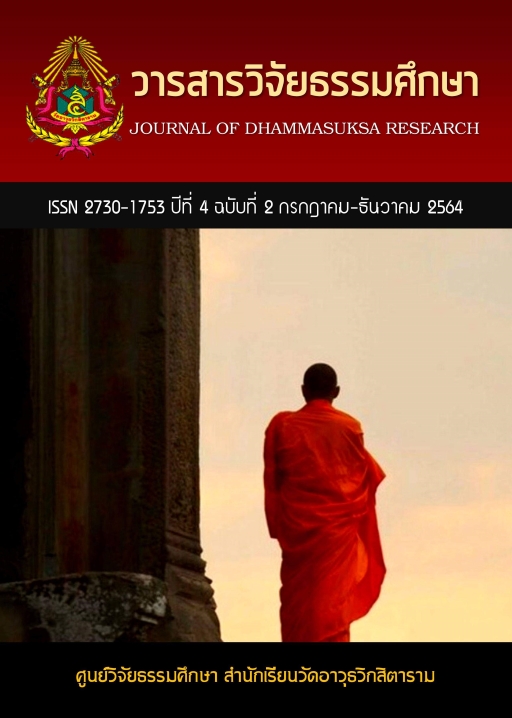ระบบการพัฒนาการบริหารบุคลากรด้านภาวะผู้นำตามแนวคิดพอดีพอควร สำหรับโรงเรียนเอกชนภาคใต้ตอนบน
คำสำคัญ:
แนวคิดพอดีพอควร, ภาวะผู้นำแบบพอดีพอควร, การศึกษาแบบพอดีพอควรบทคัดย่อ
การวิจัยนี้มีวัตถุประสงค์ (1) เพื่อศึกษาองค์ความรู้เกี่ยวกับระบบการพัฒนาการบริหารบุคลากรด้านภาวะผู้นำสำหรับโรงเรียนเอกชนในปัจจุบัน (2) เพื่อพัฒนากรอบแนวคิดสำหรับระบบการพัฒนาการบริหารบุคลากรด้านภาวะผู้นำตามแนวคิดพอดีพอควร (3) เพื่อพัฒนาระบบการพัฒนาการบริหารบุคลากรด้านภาวะผู้นำตามแนวคิดพอดีพอควร สำหรับโรงเรียนเอกชนภาคใต้ตอนบน (4) เพื่อทดสอบประสิทธิภาพของเครื่องมือการพัฒนาการบริหารบุคลากรด้านภาวะผู้นำตามแนวคิดพอดีพอควร สำหรับโรงเรียนเอกชนภาคใต้ตอนบน การวิจัยนี้เป็นการวิจัยเชิงปริมาณ กลุ่มประชากร คือ ประชากรที่เป็นกลุ่มตัวอย่าง ที่ใช้ในการวิจัยครั้งนี้เป็นบุคลากรในโรงเรียนภูบดินทร์พิทยาลัย จำนวน 96 คน เครื่องมือที่ใช้ในการเก็บรวบรวมข้อมูลการวิจัยประกอบด้วย (1) แบบประเมินระดับภาวะผู้นำของบุคลากรโรงเรียนในสภาพปัจจุบัน โดยเก็บข้อมูลก่อนการพัฒนาและหลังการพัฒนาบุคลากรในโรงเรียน?? เป็นการเก็บข้อมูลเชิงปริมาณ (2) บทเรียนในแนวทางการบริหารระบบการบริหารบุคลากรด้านภาวะผู้นำตามแนวคิดพอดีพอควรสำหรับโรงเรียนเอกชนในภาคใต้ตอนบน (3) แบบทดสอบท้ายบทเรียนการพัฒนาทักษะผู้นำ 4 แบบทดสอบ (4) แบบทดสอบเมื่อสิ้นสุดการพัฒนาตามบทเรียนทุกบทเรียน
ผลการวิจัย พบว่า 1) ภาวะผู้นำเป็นศิลปะที่ให้เกิดการจูงใจผู้อื่นให้ร่วมปฏิบัติงานเพื่อให้สำเร็จตามความมุ่งหมายประกอบด้วยองค์ประกอบดังนี้ 1) ลักษณะของงานหรือตำแหน่ง 2) คุณลักษณะเฉพาะของบุคคล และ 3) แบบแผนพฤติกรรมที่กระทำในสภาพที่แท้จริงที่มากกว่านั้น รูปแบบภาวะผู้นำของโรงเรียนเอกชนในปัจจุบัน ไม่แน่นอน แตกต่างไปตามลักษณะของภาวะผู้นำของแต่ละโรงเรียน 2) ผู้นำแบบพอดีพอควร คือ ผู้นำที่มีวิสัยทัศน์ในการลดความสูญเปล่าและให้การยอมรับนับถือซึ่งกันและกัน มีทักษะสำคัญ 4 ทักษะ คือ (1) ทักษะการเป็นนักปฏิบัติ (2) ทักษะการเป็นโค้ช (3) ทักษะการเข้าถึงงาน และ (4) ทักษะการกำหนดทิศทาง 3) ผลการวิเคราะห์จากเครื่องมือ การวิจัยระบบการพัฒนาการบริหารบุคลากรด้านภาวะผู้นำตามแนวคิดพอดีพอควร สำหรับโรงเรียนเอกชนภาคใต้ตอนบน ที่มีประสิทธิภาพใช้ได้ 81.98/ 81.51 โดยบุคลากรในโรงเรียนที่ได้รับการพัฒนาภาวะผู้นำแล้ว มีระดับการปฏิบัติตามทักษะผู้นำ ในระดับมากที่สุด (m = 4.53, s = 0.60) สูงกว่าระดับการปฏิบัติตามทักษะผู้นำก่อนที่บุคลากรในโรงเรียนได้รับการพัฒนาตามระบบการพัฒนาการบริหารบุคลากร ด้านภาวะผู้นำตามแนวคิดพอดีพอควร สำหรับโรงเรียนเอกชนภาคใต้ตอนบนซึ่งมีระดับการปฏิบัติในระดับปานกลาง (m = 2.90, s = 0.60)
เอกสารอ้างอิง
วิจารณ์ พานิชและปิยาภรณ์ มัณฑะจิตร. (2563). การศึกษาคุณภาพสูงระดับโลก. กรุงเทพฯ: มูลนิธิสยามกัมมาจล.
สำนักบริหารงานการมัธยมศึกษาตอนปลาย สำนักงานคณะกรรมการการศึกษาขั้นพื้นฐาน. (2557). เกณฑ์รางวัลคุณภาพแห่งสำนักงานคณะกรรมการการศึกษาขั้นพื้นฐาน (OBECQA) ของโครงการโรงเรียนมาตรฐานสากล ปี 2557 - 2558. กรุงเทพ: ชุมนุมสหกรณ์การเกษตรแห่งประเทศไทย.
Byrne, A. (2017). The lean turnaround: How to Implement lean, create value and grow your people. New York: McGraw-Hill.
Dombrowski, U. and Mielke, T. (2013). Lean leadership-fundamental principles and their application. Procedia CIRP, Vol.7, pp. 569-574.
Holt, P. (2016). Leading With Lean : An experience-based guide to leading a lean transformation. Netherlands: Vakmedianet.
Liker, J. K., and Convis, G. L. (2012). The toyota way to lean leadership - Achieving and sustaining excellence through leadership development. New York: McGraw Hill.
Mann, D. (2008). Creating a Lean Culture: Tools to Sustain Lean Conversions. (1 sted.). New York: Productivity Press.

ดาวน์โหลด
เผยแพร่แล้ว
รูปแบบการอ้างอิง
ฉบับ
ประเภทบทความ
หมวดหมู่
สัญญาอนุญาต
ลิขสิทธิ์ (c) 2021 วารสารวิจัยธรรมศึกษา

อนุญาตภายใต้เงื่อนไข Creative Commons Attribution-NonCommercial-NoDerivatives 4.0 International License.


